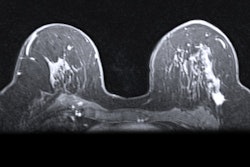Dear AuntMinnie Member,
Stroke is a common and serious condition, and patients need to be tracked after the event to assess their long-term functional outcomes. For this first MRI Insider of 2025, we're covering research conducted by a Japanese team that explored the use of synthetic MRI to gauge stroke patients' myelin volume on three month follow-up to assess them for the stroke-related condition of cerebral small vessel disease. Click here to find out what the group discovered.
We've got a plethora of MRI content that will engage your interest. Check out four studies that explored the use of AI with MRI: One to predict prostate cancer risk, another to predict breast cancer treatment response, a third to "harmonize" brain MRI data from different scanners, and a fourth to predict major adverse cardiovascular events in cardiac patients.
This month we've also reported on research from the women's imaging arena, including a study that suggests that breast MRI surveillance reduces disease recurrence; findings that indicate women with BRCA1/2 germline mutations are often denied breast MRI; and an investigation into the link between genetic testing and risk assessment and breast MRI exam uptake.
Finally, don't miss our coverage of a study that describes a new MRI method that can reveal the effects of treatment in lung transplant patients and research that shows how functional MRI illuminates brain changes caused by opioid use.
Never fear, MRI enthusiasts! In a chaotic world, you can trust that our MRI content area will keep you up-to-date on the modality's many applications. We invite you to check it out regularly, and as always, if you have MRI topics you'd like us to consider, please contact me.
Kate Madden Yee
Senior Editor
AuntMinnie.com




















